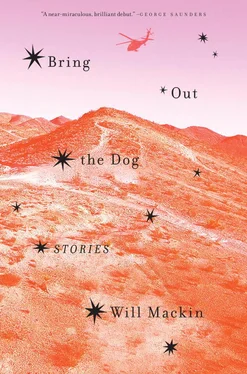Will Mackin - Bring Out the Dog
Здесь есть возможность читать онлайн «Will Mackin - Bring Out the Dog» весь текст электронной книги совершенно бесплатно (целиком полную версию без сокращений). В некоторых случаях можно слушать аудио, скачать через торрент в формате fb2 и присутствует краткое содержание. Город: New York, Год выпуска: 2018, ISBN: 2018, Издательство: Random House Publishing Group, Жанр: prose_military, на английском языке. Описание произведения, (предисловие) а так же отзывы посетителей доступны на портале библиотеки ЛибКат.
- Название:Bring Out the Dog
- Автор:
- Издательство:Random House Publishing Group
- Жанр:
- Год:2018
- Город:New York
- ISBN:978-0-812-99564-0
- Рейтинг книги:5 / 5. Голосов: 1
-
Избранное:Добавить в избранное
- Отзывы:
-
Ваша оценка:
- 100
- 1
- 2
- 3
- 4
- 5
Bring Out the Dog: краткое содержание, описание и аннотация
Предлагаем к чтению аннотацию, описание, краткое содержание или предисловие (зависит от того, что написал сам автор книги «Bring Out the Dog»). Если вы не нашли необходимую информацию о книге — напишите в комментариях, мы постараемся отыскать её.
Bring Out the Dog — читать онлайн бесплатно полную книгу (весь текст) целиком
Ниже представлен текст книги, разбитый по страницам. Система сохранения места последней прочитанной страницы, позволяет с удобством читать онлайн бесплатно книгу «Bring Out the Dog», без необходимости каждый раз заново искать на чём Вы остановились. Поставьте закладку, и сможете в любой момент перейти на страницу, на которой закончили чтение.
Интервал:
Закладка:
Will Mackin
BRING OUT THE DOG
STORIES
We saw victory and defeat, and they were both wonderful.
—Barry Hannah, “Midnight and I’m Not Famous Yet”
The Lost Troop
We had a dry spell in Logar. It was February, during which the weather was dog shit, so a degree of slowness was expected. But this went beyond slowness. It was like peace had broken out and nobody’d told us. Nights we’d meet in the OPS hut for the mission brief. We’d tune the flatscreens to the drones—over Ghazni, Orgun, and Khost—only to find all three orbiting within the same cloud. We’d listen to static on the UHF. We’d stare at phones that never rang. We might’ve left it all behind, walked off the outpost and into the desert, never to be seen again. We might’ve created the Legend of the Lost Troop. Rather, we chose someplace where we imagined the enemy might be hiding—a compound on the banks of the Helmand River, a brake shop in downtown Marjah, a cave high in the Hindu Kush—and we ventured out there, hoping for a fight.
I thought of the Japanese soldiers on Iwo Jima, who, when their island fell to the Americans, may not have known that their island had fallen. Who, not long after, may not have heard that A-bombs had destroyed Hiroshima and Nagasaki, and that their emperor had admitted defeat. Those soldiers hid in tunnels on Iwo for weeks after the war was over. For months, even. For them, the fight continued in those dark and narrow spaces, until they ran out of food. Until they drank the last of their water. Until, absent the means and/or the will to take their own lives, they climbed out of rat holes into the sun, to wander warm fields of lava rock, in surrender.
I wondered what it would take for us. If, one night, we’d drop out of the starry sky in our blacked-out helicopters near a walled compound in the desert. We’d run toward that compound with the rotor wash at our backs, pushing us into the dust cloud that had been kicked up by our arrival, and out the other side. Passing through a crooked archway in the compound’s outer wall, we’d enter the courtyard. And there, among the fig trees and goats, we’d find an American tourist with a camera strapped around his neck.
Having served his time in Afghanistan, our fellow American had gone home, fallen in love, gotten married, and had the two bow-headed daughters now hiding behind his legs. Maybe he’d wanted his girls to see how brightly the stars shone in the desert. Maybe he’d wanted to share with them all the strange places the army had sent him, way back when. I imagined that he’d look at us with understanding and remorse.
“Dudes, war’s over.”
But, as far as we knew, it wasn’t. Therefore, we’d meet in the OPS hut every night at eight. In the absence of new intelligence, we’d review old intelligence. We’d double-check dead ends and reexamine cold cases. Finding nothing mission-worthy, Hal, our troop chief, would open the floor to suggestions. It’d be quiet for a while, as everyone thought.
“Come on,” Hal would say.
He’d be standing in the middle of the plywood room. We’d be sitting on plywood tables, balancing on busted swivel chairs, leaning against the thin walls. Drones, orbiting inside moonlit thunderheads, would beam their emerald visions back to us. Lightning would strike twenty miles away and the UHF would crackle. I, for one, didn’t have any good ideas to offer.
One night, Digger spoke up. “Who remembers that graveyard decorated like a used-car lot, out in Khost?”
I raised my hand, along with a few others.
“I think we need to go back there,” Digger said.
The graveyard in question was on the northern rim of a dusty crater. We’d patrolled past it, a few weeks prior, on an easterly course. The “used-car lot” decorations were plastic strands of multicolored pennants. One end of each strand was tied high in an ash tree that stood at the center of the graveyard. The other ends were staked into the hard ground outside the circle of graves. The graves themselves were piles of stones, shaped like overturned rowboats. I couldn’t recall the name of our mission that night, its task and purpose, its outcome. But that graveyard stuck with me. I remembered the pennants snapping in the wind, dust parting around the graves like current.
Digger, who’d passed closer to the graveyard than I, thought the graves had looked suspicious. He believed they resembled old cellar doors. The type, I imagined, you’d find outside a farmhouse in Nebraska. The type you’d run to from darkened fields as a tornado was bearing down. Digger postulated that at least one of those graves was made of fake stones.
“Styrofoam balls,” he suggested to us in the OPS hut, “painted to look like stones, then glued to a plywood sheet.” Digger wondered if we might sneak into that graveyard, pull open this hypothetical door, descend a flight of stairs, and discover a Taliban nerve center, bomb factory, or armory. Digger had no idea what might be down there, but he’d gotten a weird feeling walking past that graveyard that night.
“Let’s make it happen,” Hal said.
We rode our helicopters—two dual-rotor, minigun-equipped MH-47s—southeast from Logar. We sat in mesh jump seats, across from one another, roughly ten per side. The MH-47, at altitude, stabilized like a swaying hammock. Its engines warbled like cop cars racing off to faraway trouble. Lube, dripping from the crankcase, smelled like bong water. At the back end of the tubular cargo bay, beyond the open ramp, night passed by like scenery in an old movie.
The 47s dropped us off in a dry riverbed, three miles west of the graveyard. We patrolled eastward under heavy clouds. The clouds carried a powerful static charge, while the earth remained neutral. Sparkling dust hovered, and my brothers, walking with me, appeared as concentrations of this dust. All I heard, as we walked, was my own breathing.
We connected with the crater’s westernmost point, then walked in a clockwise direction along its rim until we reached the graveyard. We found the pennants torn and tattered; the ash tree diseased; the graves crooked. None of the stones were made of Styrofoam. Not one of the graves was an elaborately disguised entrance to a nefarious subterranean activity. Though, upon closer inspection, I noticed that the dust that I’d remembered parting around the graves, resembling current, actually funneled into the spaces between stones. In fact, the dust appeared to be getting sucked into those spaces. Which made it seem like there was some sort of void below the graves, creating a vacuum, and lent a measure of credence to Digger’s theory.
From the top of one grave, I selected a smooth, round stone, about the size of a shot-put ball, and I heaved it into the crater.
Joe, our interpreter, was right there to scold me. “I would expect such disrespectful behavior from the Taliban,” he said, “but not from you.”
Joe was Afghani. His real name was Jamaluddein. Following the Soviet invasion of Afghanistan, in 1980, he’d escaped to the U.K. with his parents. Joe was twelve years old at the time. Now, as a middle-aged man, he’d returned to help save his country from ruin. He wore armor on missions, but he carried no weapons. His interpretations of our enemy’s muttered words were always clear and precise. He had a bad habit of walking too close behind me on patrol, then closing that distance whenever we made contact with the enemy. Sometimes he’d bump into me and I’d turn around. Thus, I’d seen conflagrations reflected in the smudged lenses of Joe’s glasses. I’d heard him whisper prayers between sporadic detonations. His voice, with its derived British accent and perpetual tone of disappointment, exactly matched that of my beleaguered conscience.
Читать дальшеИнтервал:
Закладка:
Похожие книги на «Bring Out the Dog»
Представляем Вашему вниманию похожие книги на «Bring Out the Dog» списком для выбора. Мы отобрали схожую по названию и смыслу литературу в надежде предоставить читателям больше вариантов отыскать новые, интересные, ещё непрочитанные произведения.
Обсуждение, отзывы о книге «Bring Out the Dog» и просто собственные мнения читателей. Оставьте ваши комментарии, напишите, что Вы думаете о произведении, его смысле или главных героях. Укажите что конкретно понравилось, а что нет, и почему Вы так считаете.












